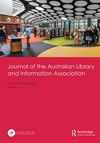‘Out of Sight, But Not Out of Mind’: A Collaborative Reflective Case Study on Including Participants with Invisible Disabilities in LIS Research
IF 1
4区 管理学
Q3 INFORMATION SCIENCE & LIBRARY SCIENCE
Journal of the Australian Library and Information Association
Pub Date : 2023-01-02
DOI:10.1080/24750158.2023.2168115
引用次数: 2
Abstract
ABSTRACT The aim of this research project was to explore the inclusion of people with invisible disabilities (PwIDs) as library and information science (LIS) research participants. At least 30 percent of Australians with a disability will have an invisible disability, such as autism, mental health, brain injuries, intellectual or learning disabilities, sensory disabilities, and neurodiversity. Yet despite constituting a distinct part of the population, the voices of people with invisible disabilities are often missing in LIS research. We critically reflected on our experiences as practitioner-researchers by individually and collaboratively documenting and evaluating our approaches to research and the context in which we engaged with PwIDs as participants in our studies. We conclude that creating a research environment that welcomes the participation of PwIDs starts before the study begins and continues throughout the research process. Our recommendations for other LIS researchers is to create welcoming and inclusive research environments as an integral part of study design; this includes being aware that participants may have invisible disabilities which may, or may not, be disclosed. Based on our critical reflection and a review of the literature, we suggest ways that researchers can better create a welcoming environment for PwIDs.“眼不见心不忘”:在LIS研究中纳入隐性残疾参与者的合作反思案例研究
摘要本研究项目的目的是探索将隐形残疾人(PwID)纳入图书馆和信息科学(LIS)研究的参与者。至少30%的澳大利亚残疾人会有隐形残疾,如自闭症、心理健康、脑损伤、智力或学习障碍、感官残疾和神经多样性。然而,尽管隐形残疾人是人口中的一个独特部分,但在LIS研究中,他们的声音往往缺失。我们通过单独和合作记录和评估我们的研究方法,以及我们作为研究参与者与普华永道会计师事务所接触的背景,批判性地反思了我们作为执业研究人员的经历。我们得出的结论是,在研究开始之前就开始创造一个欢迎普华永道参与的研究环境,并在整个研究过程中持续下去。我们对其他LIS研究人员的建议是,作为研究设计的一个组成部分,创造欢迎和包容的研究环境;这包括意识到参与者可能有无形的残疾,这些残疾可能会被披露,也可能不会被披露。基于我们的批判性反思和对文献的回顾,我们提出了研究人员可以更好地为普华永道创造一个受欢迎的环境的方法。
本文章由计算机程序翻译,如有差异,请以英文原文为准。
求助全文
约1分钟内获得全文
求助全文
来源期刊

Journal of the Australian Library and Information Association
INFORMATION SCIENCE & LIBRARY SCIENCE-
CiteScore
3.40
自引率
15.40%
发文量
65
期刊介绍:
The Journal of the Australian Library and Information Association is the flagship journal of the Australian Library and Information Association (ALIA). It is a quarterly publication for information science researchers, information professionals, related disciplines and industries. The Journal aims to stimulate discussion and inform practice by showcasing original peer reviewed research articles and other scholarly papers about, or relevant to, the Australian and Southern Asia Pacific regions. Authors from the full range of information professions and areas of scholarship are invited to contribute their work to the Journal.
 求助内容:
求助内容: 应助结果提醒方式:
应助结果提醒方式:


